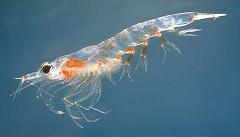Krill is a shrimp-like marine invertebrate animal found in all oceans of the world.
The small crustaceans are important organisms in the zooplankton family, and is food for many animals such as baleen whales, manta rays, whale sharks, crabeater seals, and seabirds that eat nothing else.

Krill are also known as euphausiids, named after their order Euphausiacea. The name krill comes from the Norwegian word “krill” meaning “young fry of fish”.
They are considered an important part of the food chain because they feed on phytoplankton and many creatures depend on Krill as a large part of their diet.
Krill is abundant in the Southern Ocean and in the waters around Japan, and is part of a huge commercial fishing industry.
The invertebrate is eaten by people in Japan and Russia, and is known as okiami オキアミ in Japan.
Most of the global demand for krill is for aquaculture and aquarium food, as bait in sport fishing, or in the pharmaceutical industry.
Krill live for 2 to 6 years and there is a growing market for krill oil as a dietary supplement ingredient as it is rich in omega-3 and is known to lower cholesterol and reducing arthritis symptoms and inflammation.
Krill as human food is not popular in the west due to dietary habit, and because most of the fisheries of the world haven’t yet figured out a cost effective way of catching it.
It’s probably better this way, though, because we have no idea what effect our consumption would have on the ocean-dwelling species that depend on krill for survival.
